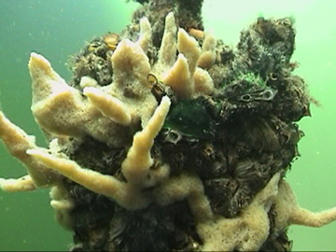|
Zebra mussels invaded the Great Lakes in 1988 and Lake Champlain in 1993. They attach to hard substrates in high densities, affecting reef spawning fishes and benthic invertebrate communities. We have documented the extension of zebra mussel colonies onto soft sediments throughout Lake Champlain, and the effect of these dense colonies on infaunal invertebrate populations and the benthic fish that feed on them. In related research, we have also been studying the effects of various factors, including light, temperature, and water chemistry, on the tendency of zebra mussels to detach from substrates and move to new areas.
Relevant Publications:
- Beekey, M. A., D.J. McCabe, and J.E. Marsden. 2004. Zebra mussels affect benthic predator foraging success and habitat choice on soft sediments. Oecologia. 141:164-170.
- Coons, K., D. J. McCabe, and J. E. Marsden. 2004. Effect of strobe lights on zebra mussel settlement and movement. J. Freshwater Ecol. 19:1-8
- Beekey, M. A., D.J. McCabe, and J.E. Marsden. 2004. Soft sediment colonization by zebra mussels facilitates invertebrate communities. Freshwater Biology 49:1-11
- McCabe, D. J., M. A. Beekey, A. Mazloff, and J.E. Marsden. 2005. Negative effect of zebra mussels on foraging and habitat use by lake sturgeon (Acipenser fulvescens). Aquatic Conservation 00:00-00
- Toomey, M., D. McCabe, and J. E. Marsden. 2002. Factors affecting movement of adult zebra mussels (Dreissena polymorpha). J. N. Am. Benthol. Soc. 21:468-475
- Burks, R. L., N. C. Tuchman, C. A. Call, and J. E. Marsden. 2002. Colonial aggregates: the effect of spatial position on zebra mussel responses to interstitial water quality. J. N. Am. Benthol Soc. 21:64-75.
|




